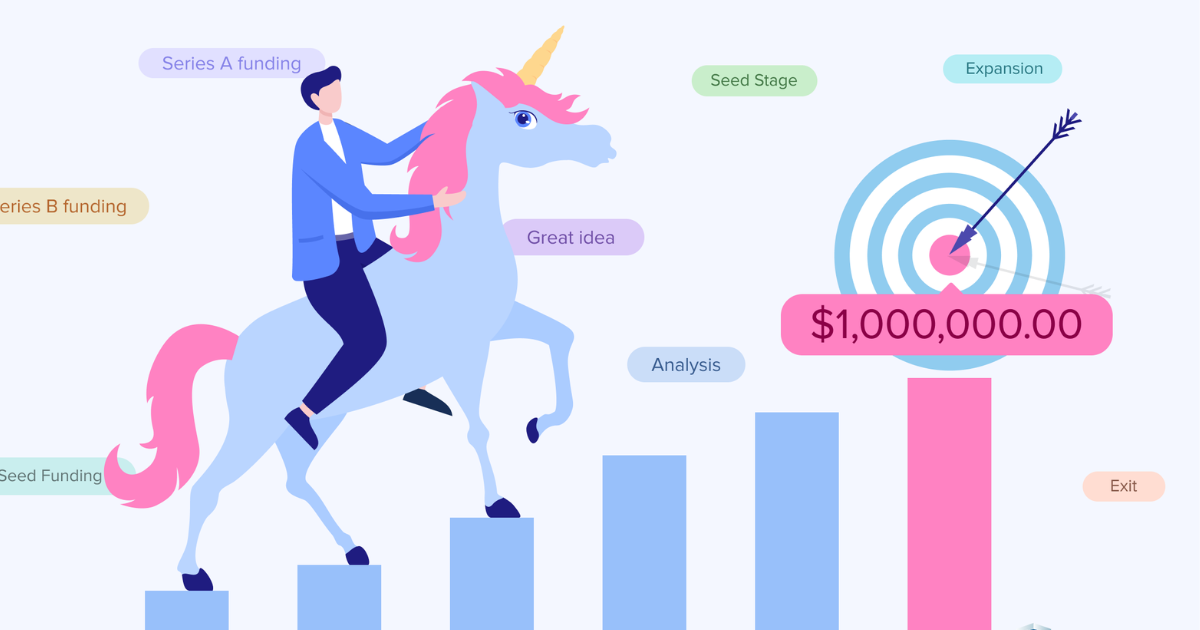STV Report predicts 45 unicorns by 2030 in the MENA Region. How Many Percent will Come from North Africa?

The term unicorn refers to a privately held startup company with a value of over $ 1 billion, according to Investopedia. It is commonly used in the venture capital industry. The term was first popularized by venture capitalist Aileen Lee. According to the CBInsight database, there are about 1,000 private companies around the world valued at $1 billion.
Africa did not have a single unicorn before Jumia’s unicorn status in 2016 when the e-commerce company was valued at more than $1 billion. However, the continent now has about 7 startups worth more than $1 billion. While this represents a significant improvement, it also portends a prosperous future for the African startup ecosystem. A recent study conducted by the Saudi Arabian technology venture capital fund, STV, predicts that over 45 start-ups valued at $1 billion (unicorns) will grace the MENA region by 2030.
STV’s forecast is based on technological advancements, consumer adoption, broad macroeconomic and regulatory reforms, and a growing talent pool, all of which cater to the region’s technology-driven population.
“We believe the region can produce 45 unicorns by 2030 and digital giants that can list on public markets, remain independent, and focus on delivering innovative solutions tailored to local needs,” STV stated.
Given the prediction, it is worth noting that Northern Africa has only produced one unicorn (Fawry) out of the continent’s seven unicorns so far.
Unicorns Operating in Africa or Owned by Africans in Diaspora:

FLUTTERWAVE – $3 BILLION
It was founded by Olugbenga Agboola in 2016 to create customizable payment applications for businesses, banks, and government organizations through its APIs. The company is also backed by two major investors: Tiger Global and Avenir Growth Capital.
Flutterwave has processed over 200 million transactions totaling more than $16 billion in 34 African countries since 2016, serving over 900,000 businesses worldwide.
In 2021, the company raised $170 million to become of the continent’s unicorns and tripled in one year, hence it became the continent’s leading fintech startup, now worth more than $3 billion.
OPAY – $2 BILLION
OPay, a Chinese-backed and Africa-focused fintech company, was founded in 2018. In August 2021, it raised $400 million in Series C funding led by SoftBank Vision Fund, bringing its valuation to $2 billion. And Source Code Capital, Redpoint China, 3W Capital, Sequoia Capital China, and Dragonball Capital are among the major Chinese investors in the company.
CHIPPER CASH – $2 BILLION
Chipper Cash is an African fintech startup that facilitates cross-border payments.
After raising its first Series C round of $100 million led by SVB Capital, the company reached a $2 billion valuation in 2021. However, A Series C extension round led by Sam Bankman-cryptocurrency Fried’s exchange platform added another $150 million to the funding round, bringing the total Series C capital to $250 million.
In 2018, two African entrepreneurs, Ugandan Ham Serunjogi and Ghanaian Maijid Moujale founded the company in San Francisco to provide a no-fee peer-to-peer cross-border payment service in Africa via their app.
WAVE – $1.7 BILLION
Wave is a mobile money provider based in Senegal and founded by two Americans (Drew Durbin and Lincoln Quirk).
The company was valued at $1.7 billion after raising $200 million in a Series A round. Also, the funding is the region’s largest Series A round, making it the first francophone African unicorn.
ANDELA – $1.5 BILLION
Andela is a global talent network that connects companies with emerging market engineering talent.
It began in Lagos, Nigeria, and has since expanded across multiple continents, with hundreds of the world’s top companies relying on it to help them seamlessly tap into global brilliance.
Iyinoluwa Aboyeji, Ian Carnevale, Jeremy Johnson, and Christiana Sass founded the company in 2004.
Andela announced a $200 million Series E fundraising round in September 2021, raising the company’s valuation to $1.5 billion.
INTERSWITCH – $1 BILLION
Interswitch achieved unicorn status in 2019 after Visa acquired a minority equity stake in the company.
Mitchell Elegbe founded the Nigerian financial services firm in 2002, with its headquarters in Lagos. The company pioneered financial ecosystem infrastructure on the continent.
ESUSU – $1 BILLION
Esusu became one of the few startups with a black founder to break the $1 billion valuation barrier in January.
Also, the Nigerian fintech firm recently received a $130 million Series B funding round to help bridge the racial wealth gap.
The fintech platform was founded in 2018 by Indian Samir Goel and Nigerian Abbey Wemimo, which reports rental data to help tenants build credit scores while also helping property owners increase revenue.
FAWRY – $ 1 BILLION
Egypt’s pioneering fintech company, Fawry became Egypt’s and the North African region’s first technology company to be valued at a billion dollars in 2021. The fintech company, which is listed on the Egyptian Exchange, offers payment services to clients, consumers, and businesses through over 225,000 locations and a variety of channels.
It recently passed the $2 billion market cap mark, making it the fourth most valuable company on the Egyptian Exchange (EGX).
Ashraf Sabry founded the company in 2015, and it is one of Egypt’s largest providers of alternative digital payments.
JUMIA – $1 BILLION
Jumia, a pan-African e-commerce company listed on the New York Stock Exchange, was founded in 2012 by ex-McKinsey consultants Jeremy Hodara and Sacha Poignonnec, along with Tunde Kehinde and Raphael Kofi Afaedor.
In 2016, the company became the continent’s first unicorn, with a more than $1 billion valuation.
The possible Next Unicorns from North Africa

In 2021, the northern African region received a total of $166.1 million in investment across 52 funding rounds. This is more than the $145.8 million raised in 110 funding rounds in 2020.
In H1 2022, tech startups in the region raised approximately $530 million, which is 3.2 times the amount raised in the same period last year. In addition, the region is growing faster than the continental average (3.2x vs. 2.3x).
Several startups come to mind when discussing North African tech startups whose valuation may be greater than a billion US dollars in 2030, but a few of them will be discussed here specifically due to their ability to attract large funding in previous rounds and how they have been disrupting the region with their unique offerings in recent times.
Egypt’s SWVL ($264 million)
Swvl is a technologically advanced mass transit solution that provides intercity, intracity, B2B, and B2G transportation products and services. Mostafa Kandil, Ahmed Sabbah, and Mahmoud Nouh founded the Egypt-born and Dubai-based mobility fintech startup in 2017. It is currently present in 135 cities across 20 countries in Latin America, Europe, Africa, and Asia.
Tunisia’s InstaDeep ($107 million)
Karim Beguir and Zohra Slim founded InstaDeep in 2014. The Tunisian startup, headquartered in London and with offices in Paris, Tunis, Lagos, Dubai, and Cape Town, employs advanced machine learning techniques to bring AI to enterprise applications.
In March 2017, PCMag ranked InstaDeep as one of the Top20 Global Startups, and Nvidia named it a preferred partner for 2019.
In April 2019, it received a $7 million funding round from Afrivest, FIVE, as well as Endeavor Catalyst, a New York-based fund under Endeavor, and various individual shareholders, including the founding and sponsoring partners.” Alpha Intelligence Capital and CDIB. It secured a $100 million Series B funding round in January this year.
Egypt’s Alfa Medical Group ($100 million)
Egypt’s Alfa Medical Group is a healthcare provider in Egypt that includes medical labs, radiology centers, and hospitals. On February 3, 2021, the company received a $100 million private equity investment from Africa Platform Capital, British International Investment, and Cinven.
Egypt’s Vezeeta ($73 million)
Vezeeta is a digital healthcare startup based in the Middle East and Africa. It provides border-around outpatient services to provide patients with convenient and unparalleled experiences. The company’s platform provides a seamless digital platform for patients to search, choose, and book their healthcare providers based on real patient reviews and ratings, live doctors’ scheduling, location, fees, and health insurance providers, as well as automated reminders for refills to ensure medication compliance and a delightful healthcare experience for all patients, allowing patients to schedule appointments for in-clinic, virtual, or at-home consultations.
It raised a $40 million Series D funding round in February 2020, led by UAE-based Gulf Capital, with additional investment from existing Riyadh-based investor Saudi Technology Ventures (STV), which previously led Vezeeta’s Series C round in September 2018.
With stability in the region and the respective governments’ continuous support of the tech ecosystem, tech startups in the region will feature prominently in the Saudi Technology Ventures (STV) projected 45 new unicorns across the MENA region by 2030.
